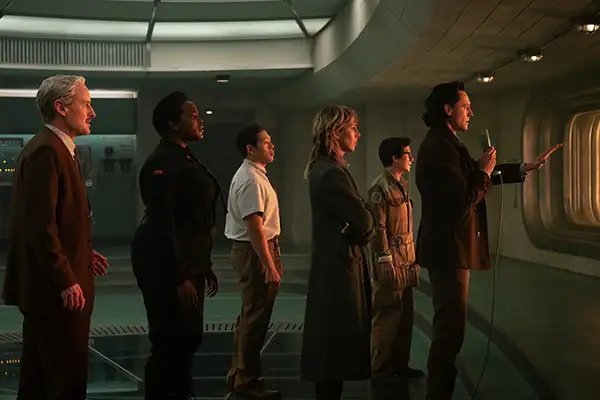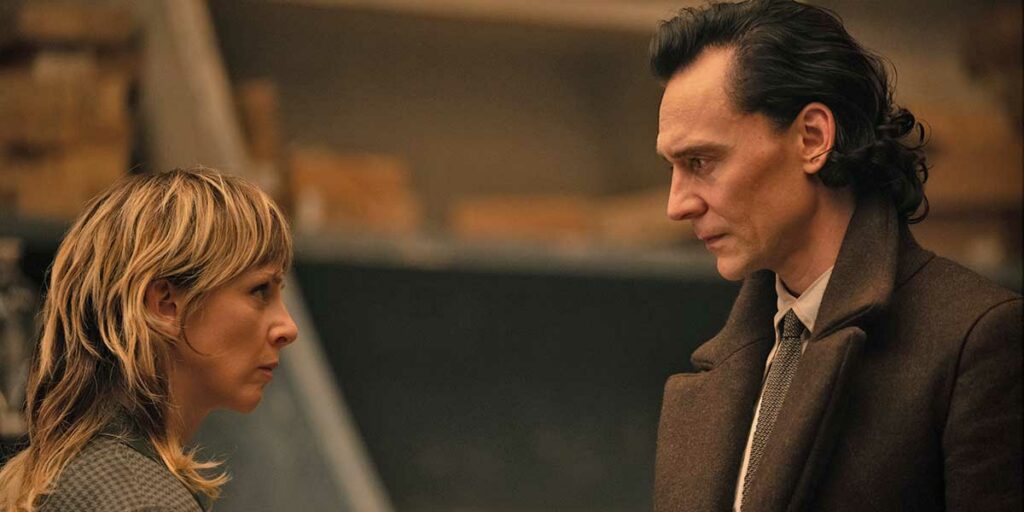The Loki season 2 finale is not only a great finale in its own right, but also an interesting examination of the current state of the MCU.
The word on the street is that the Marvel Cinematic Universe is in crisis, and if you believe the current flood of reports hitting the internet, it seems like we’re about one more flop away from Kevin Feige smashing the “in case of emergency” button and bringing back both Robert Downey Jr. and Scarlett Johansson. This constant sense of being unsure of the present and yearning for the success of the past seems to be plaguing every MCU product nowadays, so it’s somewhat amusing to see the Loki season 2 finale tackle that in the most literal way possible – by having Loki (Tom Hiddleston) actually revisit several moments from previous episodes in an attempt to fix whatever caused the problems he’s currently facing.
Now, I’m not saying that Marvel intended for this episode to be interpreted as Kevin Feige’s desperate cry for help, but it certainly plays like that. Episode 5 ended with the titular character having just gained the ability to control his “time-slipping”, meaning that he can now travel to essentially any point in time, an incredibly useful power to gain mere seconds before the apocalypse. With everyone else dead, it’s left up to Loki to revisit various points in season 2 and try to figure out where exactly things went wrong, and how he can fix it. Hiddleston’s face does so much of the work here, helping him massively in portraying this once-maniacal god as a now broken man, on his last legs after losing everything he cared for. Every word is filled with exhaustion, every action feels like it’s his last hope; it’s easily one of the MCU’s greatest lead performances.
As Loki rushed about the timestream, with no real idea of how to fix anything, I couldn’t help but be reminded of everything going on with the Marvel Cinematic Universe right now. Their next upcoming release, The Marvels, seems like it may unfortunately be poised to flop, and they currently only have one movie slated for 2024. Their shows are garnering fewer and fewer viewers, and as a result, reports have speculated that they may be considering binning off the Kang the Conqueror (Jonathan Majors) storyline that they’ve spent the last 4 years building up to. It’s utter chaos, and completely different to what we saw from Marvel Studios during their peak in the 2010s, where their model seemed to be the prime example of a studio that knew what worked and could churn that out at a reliable rate. In some ways, it’s completely understandable why Kevin Feige seems to feel a need to revisit that era every chance he gets.
When exactly did it go wrong? This is the question that Loki just can’t seem to answer throughout the season 2 finale, and for Feige, it’s a similarly tough one. One might argue that audiences gave up the second Avengers: Endgame (2019) finished, but Spider-Man: No Way Home (2021) still did great, so is it really that simple? Maybe it was when the MCU seemed to shift focus and started to feel like they were prioritising fan service and cameos over everything else. “If it can’t be applauded and clipped for TikTok, why bother?”, seems to be the attitude that a lot of Marvel projects have nowadays regarding genuinely interesting plot developments. That might be why, despite all my problems with the current state of the MCU, I still ultimately enjoyed the Loki season 2 finale, because it didn’t go down that tried, obvious route.

It’s funny that despite being presented with the easiest way imaginable to stuff in cameos and fan service, this was the time when Marvel relented. Loki may spend the episode travelling the time-stream, revisiting his past, but we never do see his half-brother Thor, his father Odin, not even any of the Avengers. It’s a sign of life, a signal that maybe the MCU isn’t as doomed as we might have thought. It would have been so easy for them to turn this admittedly gimmicky power into an excuse to stuff this episode full of fanservice, but instead, they take a step back and let Loki’s newfound power actually serve the story, and more importantly, his character arc. As much as I want to analyse this episode from a meta-perspective, I simply can’t ignore what this story is actually about: a man taking back his identity.
For the past two seasons, we’ve watched Loki go from this seemingly all-powerful force of evil to a broken shell of a man, who feels just as human as you and I. I seem to recall remarking in a prior review that Loki barely feels like the past version of himself anymore, and it brings me a lot of pleasure to see that actually be addressed in the show, because yeah, the man we’ve been watching this season hasn’t felt like the Loki we know in the slightest. We’ve gotten the odd glimpse of him using his powers here and there, but for the most part, there hasn’t been much to discern him from the other TVA members. In the season 2 finale, however, that changes.
Loki is presented with an incredibly human problem: the idea that sometimes, there’s nothing we can do. Despite seemingly having the power to change everything, Loki still can’t actually fix the issue, and it’s perhaps the most relatable his character has ever felt. However, in the end, we’re reminded of something. Loki isn’t like us: he’s not just another TVA member, he’s not just another human. He’s a god, in every sense of the word. If he can’t fix the problem one way, he’ll just find another, using his awe-inspiring set of powers. The end of Loki season 2 felt satisfying to me because it wasn’t just a man fixing a seemingly impossible problem; it was a god taking back his identity that he’d slowly been robbed of. A god taking his place back up in the heavens, back on top of the throne, having gained something on the way. In Loki’s case, he made actual friends, ones he’ll cherish for the rest of time, and seeing him sit on top of his throne, content with that fact, is the happiest I’ve felt for any MCU character.
Perhaps Kevin Feige could stand to learn a lesson or two from the Loki season 2 finale. So much of what made the MCU work in the first place was that the films they were making were genuinely good. Films like Iron Man (2008) and The Avengers (2012) were a step above the other superhero films being released at the time, and it’s fair to say that more recent flops like Ant-Man and the Wasp: Quantumania (2023) don’t feel like they’re up to the same level. Maybe then, as Loki proposes, the answer isn’t that Kevin Feige needs to go back in time and bring back various characters from the past in an attempt to make his audience clap in the cinema, but instead that he simply needs to put his focus into making good, engaging stories again. The MCU obviously won’t always work, that’s a given. But, when it does, when it gets everything right, well, it is pretty glorious to behold.
The Season 2 Finale of Loki is now available to watch on Disney Plus. Read our review of The Marvels!

